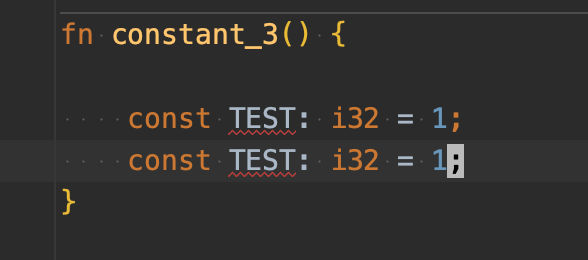3.1 Variables and Mutability
let x = 5; immutable
let mut x = 5; mutableConstants
const THREE_HOURS_IN_SECONDS: u32 = 60 * 60 * 3;You declare constants using the const keyword instead of the let keyword, and the type of the value must be annotated.
note= const 还能不能被 Shadowing 呢?
as the showing in the picture, const can not be shadowing

Shadowing
遮蔽
fn main() {
let x = 5;
let x = x + 1;
{
let x = x * 2;
println!("The value of x in the inner scope is: {x}");
}
println!("The value of x is: {x}");
}cargo run
Compiling variables v0.1.0 (file:///projects/variables)
Finished dev [unoptimized + debuginfo] target(s) in 0.31s
Running `target/debug/variables`
The value of x in the inner scope is: 12
The value of x is: 6
Data Types
scalar:标量
compound:复合
Scalar Types
Rust has four primary scalar types: integers, floating-point numbers, Booleans, and characters.
integers
| Length | Signed | Unsigned |
|---|---|---|
| 8-bit | i8 | u8 |
| 16-bit | i16 | u16 |
| 32-bit | i32 | u32 |
| 64-bit | i64 | u64 |
| 128-bit | i128 | u128 |
| arch | isize | usize |
Additionally, the isize and usize types depend on the architecture of the computer your program is running on, which is denoted in the table as “arch”: 64 bits if you’re on a 64-bit architecture and 32 bits if you’re on a 32-bit architecture.
Note that number literals that can be multiple numeric types allow a type suffix, such as 57u8, to designate the type.
| Number literals | Example |
|---|---|
| Decimal | 98_222 |
| Hex | 0xff |
| Octal | 0o77 |
| Binary | 0b1111_0000 |
| Byte (u8 only) | b’A’ |
Info
Integer Overflow
Let’s say you have a variable of type
u8that can hold values between 0 and 255. If you try to change the variable to a value outside that range, such as 256, integer overflow will occur, which can result in one of two behaviors. When you’re compiling in debug mode, Rust includes checks for integer overflow that cause your program to panic at runtime if this behavior occurs. Rust uses the term panicking when a program exits with an error; we’ll discuss panics in more depth in the “Unrecoverable Errors withpanic!” section in Chapter 9.When you’re compiling in release mode with the
--releaseflag, Rust does not include checks for integer overflow that cause panics. Instead, if overflow occurs, Rust performs two’s complement wrapping. In short, values greater than the maximum value the type can hold “wrap around” to the minimum of the values the type can hold. In the case of au8, the value 256 becomes 0, the value 257 becomes 1, and so on. The program won’t panic, but the variable will have a value that probably isn’t what you were expecting it to have. Relying on integer overflow’s wrapping behavior is considered an error.To explicitly handle the possibility of overflow, you can use these families of methods provided by the standard library for primitive numeric types:
- Wrap in all modes with the
wrapping_*methods, such aswrapping_add.- Return the
Nonevalue if there is overflow with thechecked_*methods.- Return the value and a boolean indicating whether there was overflow with the
overflowing_*methods.- Saturate at the value’s minimum or maximum values with the
saturating_*
Numeric Operations
Rust supports the basic mathematical operations you’d expect for all the number types: addition, subtraction, multiplication, division, and remainder. Integer division truncates toward zero to the nearest integer. The following code shows how you’d use each numeric operation in a let statement:
fn main() {
// addition
let sum = 5 + 10;
// subtraction
let difference = 95.5 - 4.3;
// multiplication
let product = 4 * 30;
// division
let quotient = 56.7 / 32.2;
let truncated = -5 / 3; // Results in -1
// remainder
let remainder = 43 % 5;
}